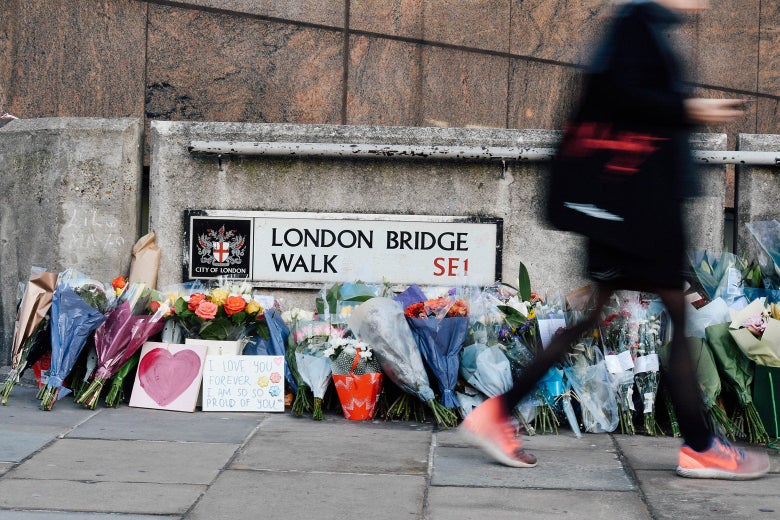
Bouquets of flowers are placed on London Bridge in memory of the victims of last week’s attack in central London.
Daniel Leal-Olivas via Getty Images
Last Friday, Usman Khan entered a prison rehabilitation conference in central London and began stabbing attendees, killing two. The conference was honoring the fifth anniversary of Learning Together, a trailblazing prison education program developed by academics at the University of Cambridge’s Institute of Criminology. The program paired participating graduate students from the Institute—including me in 2017—with incarcerated students, in courses run within British prisons. Khan, who’d been released from prison in 2018 after serving eight years on a terrorism-related conviction, had been invited to the conference as an alum of the program.
The tragedy, now known as the London Bridge attack, has been cast to the center of British politics by Prime Minister Boris Johnson to whip up popular punitive sentiment in an election year. In the immediate aftermath, he took to BBC One’s The Andrew Marr Show and, in wholesale terms, denounced early release laws and parole schemes. He suggested that others who had been released early from prison could be just as dangerous.
“I do think there is an issue, as I’ve said, about automatic early release,” Johnson said. “I think it’s wrong for serious sexual offenders. I think it’s wrong for violent offenders. I think it’s wrong for terrorists.”
Reactions like this are a repudiation of the possibility of rehabilitation, of the very principles animating Learning Together and its champions. We must resist these distortions, both in the U.S. and in the U.K., and not let reactionary politics stoke new levels of human misery among the incarcerated. One place to start is to seek a basic understanding of what Learning Together is and what it has meant to its participants.
We must not let reactionary politics stoke new levels of human misery among the incarcerated.
In the winter and spring of 2017, I was part of the small group of graduate criminology students that made a weekly trip from the University of Cambridge to HMP Grendon, a unique therapeutic community prison in the English countryside—the likes of which has become increasingly rare in the U.K. and nonexistent in the U.S. Our group included Jack Merritt, one of the victims of the London Bridge attack who, after completing his graduate studies in 2017, would decide to remain with Learning Together as a program coordinator—testimony both to his commitment to social justice and to the program’s inspirational appeal. We’d attend a class alongside a group of men then incarcerated at Grendon. One of those men, Marc Conway, now a prison reform advocate, responded to the stabbing inside Fishmongers’ Hall by running down the attacker, imitation suicide vest and all, along the bridge.
Together, Conway, Jack Merritt, and the rest of us read canonical works in sociology and criminology, and we shared views on punishment, social repair, and what a just and redemptive politics might entail. We’d discuss punitive populism and moral panics, in which moments of heightened anxiety are seized upon in sensationalist tabloid coverage and fed into tough-on-crime carceral measures. Only now, in a surreal reversal, Jack has been superimposed onto a similar political concoction. His family, with clarity and incisiveness, has called this out.
The program didn’t just end with the academic year. Upon release, formerly incarcerated alumni became integral participants in a new and liberating way, joining in its conferences and advocacy work, their knowledge of the realities of imprisonment and of what prisoners need taken seriously. We should recognize that many formerly incarcerated members of the Learning Together network made the trip to London for the Friday conference, welcomed into an ornate hall—replete with fixtures of wealth and elite advantage, narwhal tusks and all—as full participants in building a more humane and effective criminal justice system.
Some have used Friday’s tragedy to write off such dedication to rehabilitate and reintegrate as blind and naïve, or, most cynically, to blame it as the cause of the attack. But this reaction extrapolates from an isolated incident and rests on a number of false premises, vastly oversimplifying the complicated process of prison release and reentry.
The release of Khan on license, the British equivalent of American parole, is primarily a consequence of the overburdened and underfunded parole system—a function of the decades of austerity cuts within Her Majesty’s Prison Service. Conservative British governments have perpetually gutted the financing of in-prison and probation services, and for many years, practitioners have warned of the problems posed by this arrangement. The British Ministry of Justice, which runs courts and prisons, has seen its budget cut by 40 percent over the decade.
This austerity has worsened inhumane prison conditions, wrong in and of themselves but also troubling for how they undermine what rehabilitative benefits prisons purport to provide. It is common in the U.K. for three prisoners to share two-person cells with as little as one hour per day outside the cells. Individuals reentering society lack access to needed support services, though research has emphasized the importance of robust probation and supervision networks to support newly reentering individuals during the license/parole period. Learning Together is one nongovernmental example of ex-offender engagement and community reintegration, of extending the rehabilitative process beyond prison and into release—but it cannot go it alone.
Perhaps Khan hadn’t reformed or was reradicalized into terrorism after his release. Whether or not this was a deranged act or one of terror calculated to foment public fear and moral decay, we should ask why, of all possibilities, a prison education conference was targeted. To seek knee-jerk draconian fixes is to betray what Learning Together represents: the promise of redemption, the power of unlikely community.
Readers like you make our work possible. Help us continue to provide the reporting, commentary and criticism you won’t find anywhere else.
Join Slate Plusfrom Slate Magazine https://ift.tt/387UGms
via IFTTT
沒有留言:
張貼留言